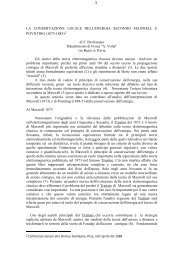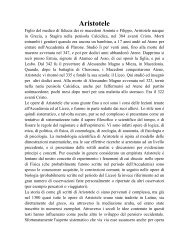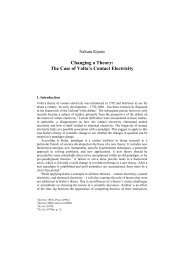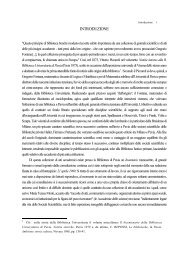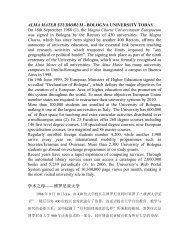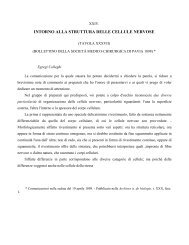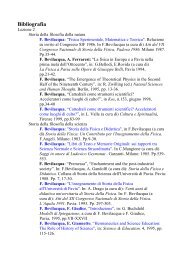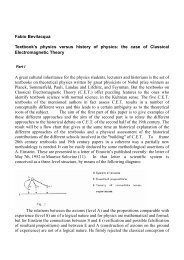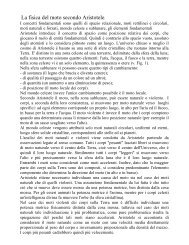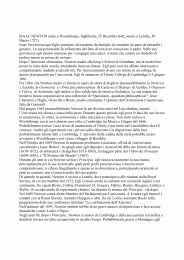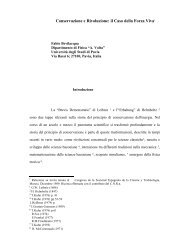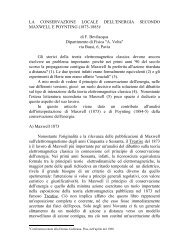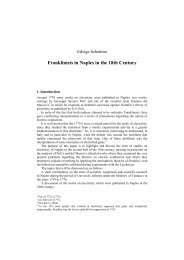Conservation and Innovation : Helmholtz's Struggle with Energy ...
Conservation and Innovation : Helmholtz's Struggle with Energy ...
Conservation and Innovation : Helmholtz's Struggle with Energy ...
Create successful ePaper yourself
Turn your PDF publications into a flip-book with our unique Google optimized e-Paper software.
The widespread lack of discussion in the contemporary secondary<br />
literature of the great works on the history <strong>and</strong> meaning of the principle of<br />
conservation of energy written at the turn of the century seems an (intentionally)<br />
missed opportunity 515. Detailed analysis of the works of all the "pioneers"<br />
mentioned so far appear in these "classic" works, often the clarification of the<br />
problems at issue is very sharp <strong>and</strong> the different meanings of principles, models,<br />
mathematical tools, experimental techniques are precisely outlined. This lack of<br />
discussion entails also the problem of the originality of the modern<br />
interpretations. In fact, always taking Kuhn's paper as an "exemplar", it is<br />
possible to trace back some main themes of his analysis: the refusal of the<br />
priority approach to Merz 516 <strong>and</strong> Haas 517, the relevance of the conversion<br />
processes, of the concern <strong>with</strong> engines <strong>and</strong> the related importance of the "work"<br />
concept to Helm 518, Merz 519 <strong>and</strong> Haas 520; <strong>and</strong> the "influence" of Naturphilosophie<br />
again to Haas 521.<br />
Given that the mentioned 'classic' works deal <strong>with</strong> more 'actors' <strong>and</strong> in<br />
greater detail than what Kuhn does, I am inclined to think that in Kuhn's paper<br />
the selection presented <strong>and</strong> the way in which it is presented depends on the<br />
particular problem chosen: to explain the origins of the "simultaneous discovery".<br />
An alternative starting point is then needed. How is <strong>Helmholtz's</strong> paper<br />
framed by other historians? The problem of Kantian influences has been taken up<br />
by Heimann, <strong>with</strong> an analysis centred on <strong>Helmholtz's</strong> justification of the central<br />
515 Kuhn in fact quotes Helm, Haas <strong>and</strong> Mertz, <strong>and</strong> Planck's 1887 treatise is discussed<br />
by Hiebert in: Hiebert, Erwin. The Conception of Thermodynamics in the Scientific Thought<br />
of Mach <strong>and</strong> Planck. Freiburg i. Br.: Ernst Mach Institut der Fraunhofer Gesellschaft zur<br />
Forderung der angew<strong>and</strong>ten Forschung, 1968. (E.Mach Inst. Bericht Nr. 5/68). Elkana avoids<br />
discussing Planck's treatise simply asserting that: "his (Planck's 1887) insights <strong>and</strong> explanations<br />
are far beyond any methodological school." see: Elkana A case of? P.31.<br />
516 Merz, John. A History of European Thought In The Nineteenth Century. 2<br />
vols.Edinburgh <strong>and</strong> London: Blackwood, 1903. Vol2 p.98.<br />
517 Haas Entwickl . P.98.<br />
518 Helm Energetik Pp.7-34.<br />
519 Merz European vol 2 Pp.100-1 <strong>and</strong> 104-11.<br />
520 Haas Entwickl.. Pp. 63-92.<br />
521 Ibid Pp.35-45..



